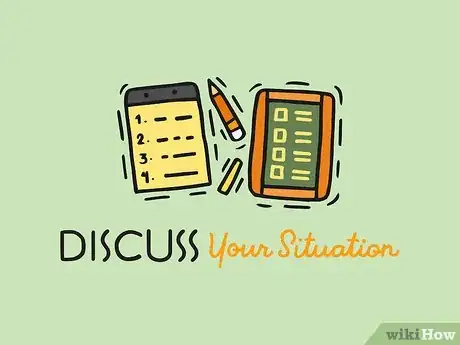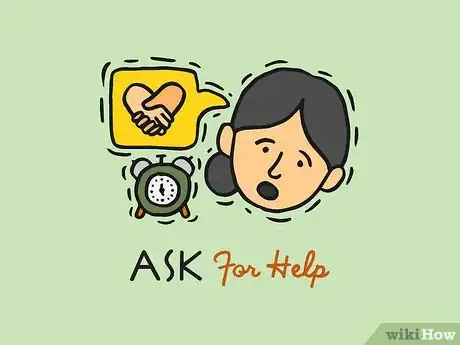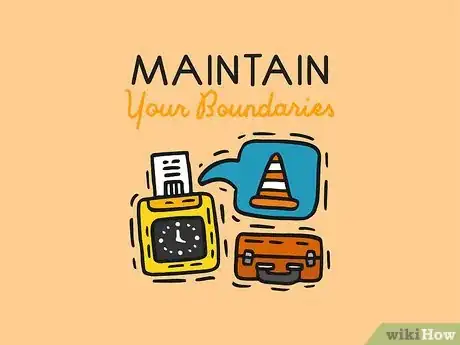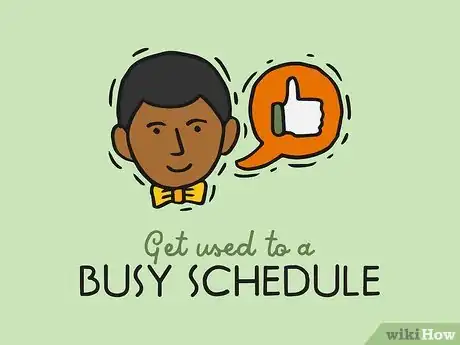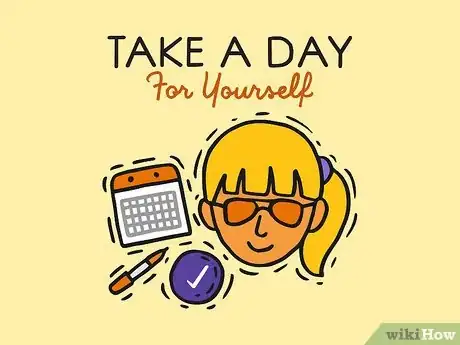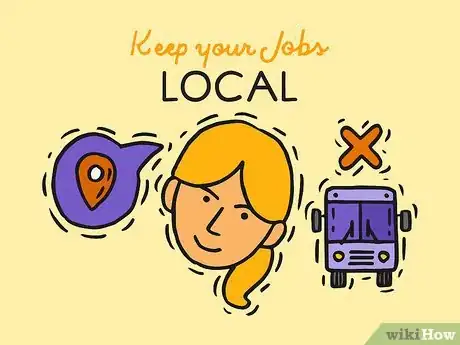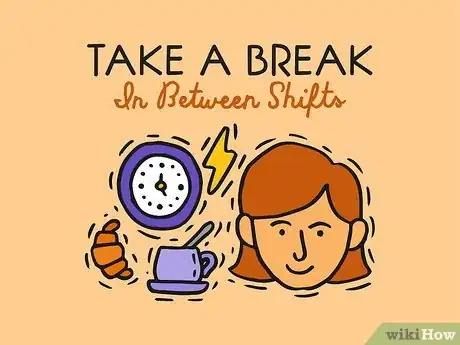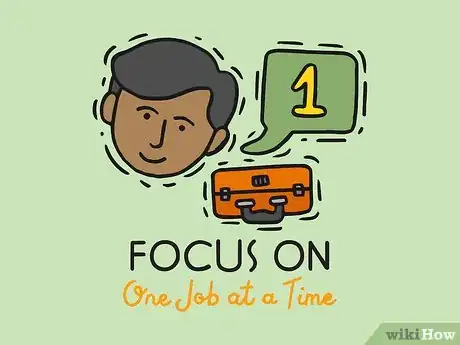This article was co-authored by Amber Rosenberg, PCC. Amber Rosenberg is a Professional Life Coach, Career Coach, and Executive Coach based in the San Francisco Bay Area. As the owner of Pacific Life Coach, she has 20+ years of coaching experience and a background in corporations, tech companies, and nonprofits. Amber trained with the Coaches Training Institute and is a member of the International Coaching Federation (ICF).
wikiHow marks an article as reader-approved once it receives enough positive feedback. In this case, 100% of readers who voted found the article helpful, earning it our reader-approved status.
This article has been viewed 269,931 times.
Working more than one job is not an ideal employment situation, but it can often be necessary. You may find yourself piecing together an income from several part-time jobs, or you may want to earn a little extra spending money on top of your regular paycheck. In any case, learning how to handle two or more jobs requires some special considerations. These considerations will help you manage your time and keep you from becoming overwhelmed by multiple jobs.
Steps
Managing Your Time
-
1Use a day planner to keep track of your schedule. Holding more than one job can lead to missed appointments and late arrivals to work if you do not keep track of where you need to be each day. Keeping track of your daily schedule in a day planner can help you to remember where you need to be each day.[1]
- If you have an extra hectic schedule, try getting a day planner with 15 minute time slots to plan your day in smaller chunks.
-
2Discuss your situation with your bosses. While you may be tempted to avoid telling your bosses about your situation, you are better off letting them know what your schedule is like. Your bosses may even be willing to work with you when scheduling your hours.[2]Advertisement
-
3Make to-do lists. It can be difficult to remember everything that you need to do when you work two different jobs in the same day. To help you remember your tasks, try making a to-do list for each job at the beginning of your day. As you complete items on your to-do lists, check them off so that you know what you have and have not completed.[3]
-
4Ask for help from your family, friends, or significant other. Balancing two jobs and a long work week may make it hard to keep your home clean, cook your own meals, and take care of other responsibilities.[4]
- Ask your family, friends, or significant other for help with cooking, cleaning, child care or other necessary tasks. Make sure that you thank them for helping and do little things to let them know how much you appreciate the help. A simple note or a big hug can go a long way.
- Try arranging a freezer meal exchange with your friends. A freezer meal exchange is when a group of people all agree to make a dish, then divide the dish into enough servings for all of their friends and freeze them. Then, everyone gathers at someone’s house to distribute the meals and everyone leaves with several dinners to reheat during the week.
-
5Maintain your boundaries. Make sure that you set some boundaries about when your work day begins and ends. Otherwise, you may end up working past your scheduled work hours, especially if you work from home for one of your jobs.[5]
- If you have plans to do something fun with family or friends, don’t let work overtake your plans. Keep your social appointments as well as your professional ones.
Dealing with Stress
-
1Get used to a busy schedule. Working two or more jobs means that you are going to be very busy most days. Try to start seeing this busy pace as your norm and welcome a bit of craziness into your life. Do your best to maintain a positive attitude and make the most of this chaotic period in your life.[6]
-
2Try to take a day for yourself each week. When working two or more jobs, it can be easy to forget to take time for yourself. But it is important to make sure that you have time to reconnect with friends and family, relax, and rest. If possible, set aside a day each week where you do not work any of your jobs.[7]
- Plan a fun day with your family or friends, go to a museum, see a movie, or just lie around in your pajamas and read all day.
-
3Stay connected to your family and friends. Working two or more jobs may cause you to feel disconnected from the people you care about. Therefore, it is important to find ways to stay connected even when you can’t see people.
- Call or text your friends often and use social media to update people on your whereabouts and accomplishments.
- Just remember that phone calls, text messages, and social media are not equal substitutes for face-to-face interactions with your loved ones, so schedule in-person meetings as well. Try meeting a friend for lunch or a quick drink after work.[8]
-
4Sleep as much as you can. Working more than two jobs can lead to exhaustion and sleep deprivation. If you are going right from one job to the next or if you are working late nights at one of your jobs, you may have an even higher risk of becoming sleep deprived or suffering from exhaustion.[9]
- Go to bed early if you have a long day ahead of you and take naps whenever possible. Even a 20-minute nap before heading to your second job may help you to feel more alert and refreshed.
-
5Treat yourself now and then. Many people work more than one job for financial reasons, but if you save every penny you earn, you may start to feel like there is no benefit to working so much. While you still want to use some of the money you earn on things that will benefit your financial health, such as credit card payments and savings, you should also treat yourself every now and then.[10]
- Buy yourself a new outfit, get a pedicure, or go out to a fancy dinner with your friends once in a while.
-
6Keep your jobs local, if possible. Long commutes can make your shifts at work seem even longer and lead to burnout. Therefore, it is best if you can work jobs that do not require much of a commute. Keep both of your jobs as local as possible to help keep your stress down.[11]
Getting the Most Out of Your Second Job
-
1Choose a second job that you will enjoy and benefit from. There are lots of ways that you can work two jobs, but the ideal second job is something that you enjoy and will benefit from in the long run. Try to find a second job that allows you to indulge in one of your hobbies or that provides you with new skills that will make you more marketable in the future.[12]
- For example, if you love video games, then you might enjoy working at a retail video game store.
-
2Take a break in between shifts. Going straight from one job to the next can be depressing, so try to find a way to take a break before you go from one job to the next. The break does not have to be a long one to help ease the transition from one job to the next. Even a 30-minute break can help.[13]
- For example, you could stop off at a favorite coffee shop and sit and enjoy a cup of coffee in the shop before heading to your next job.
-
3Focus on one job at a time. It can be difficult to manage two or more jobs, which may cause some people to try to do work for one job while they are on the clock for another job. However, this is a bad idea. Not only may doing work for one job while you are on the clock for another job get you into trouble, it will reduce your effectiveness.[14]
- Stay focused on one job at a time to do the best work that you can at all of your jobs.
Expert Q&A
Did you know you can get expert answers for this article?
Unlock expert answers by supporting wikiHow
-
QuestionHow can I get enough rest and relaxation with two jobs?
 Amber Rosenberg, PCCAmber Rosenberg is a Professional Life Coach, Career Coach, and Executive Coach based in the San Francisco Bay Area. As the owner of Pacific Life Coach, she has 20+ years of coaching experience and a background in corporations, tech companies, and nonprofits. Amber trained with the Coaches Training Institute and is a member of the International Coaching Federation (ICF).
Amber Rosenberg, PCCAmber Rosenberg is a Professional Life Coach, Career Coach, and Executive Coach based in the San Francisco Bay Area. As the owner of Pacific Life Coach, she has 20+ years of coaching experience and a background in corporations, tech companies, and nonprofits. Amber trained with the Coaches Training Institute and is a member of the International Coaching Federation (ICF).
Pacific Life Coach
Warnings
- Avoid relying on substances like caffeine and alcohol to regulate your alertness and stress. Building a tolerance to these substances can quickly hinder your ability to focus and rest.⧼thumbs_response⧽
References
- ↑ https://www.mindtools.com/pages/article/newCDV_26.htm
- ↑ https://www.mindtools.com/pages/article/newCDV_26.htm
- ↑ https://www.mindtools.com/pages/article/newCDV_26.htm
- ↑ http://lifehacker.com/how-can-i-balance-multiple-jobs-without-losing-my-mind-506383398?disableinsets=on&utm_expid=66866090-49.VYy4WCNHSyuP6EmjnM93MQ.2
- ↑ http://lifehacker.com/how-can-i-balance-multiple-jobs-without-losing-my-mind-506383398?disableinsets=on&utm_expid=66866090-49.VYy4WCNHSyuP6EmjnM93MQ.2
- ↑ http://lifehacker.com/how-can-i-balance-multiple-jobs-without-losing-my-mind-506383398?disableinsets=on&utm_expid=66866090-49.VYy4WCNHSyuP6EmjnM93MQ.2
- ↑ https://www.mindtools.com/pages/article/newCDV_26.htm
- ↑ http://www.moneyunder30.com/surviving-a-second-job-moonlighting-tips
- ↑ http://lifehacker.com/how-can-i-balance-multiple-jobs-without-losing-my-mind-506383398?disableinsets=on&utm_expid=66866090-49.VYy4WCNHSyuP6EmjnM93MQ.2
- ↑ http://lifehacker.com/how-can-i-balance-multiple-jobs-without-losing-my-mind-506383398?disableinsets=on&utm_expid=66866090-49.VYy4WCNHSyuP6EmjnM93MQ.2
- ↑ https://www.mindtools.com/pages/article/newCDV_26.htm
- ↑ https://www.mindtools.com/pages/article/newCDV_26.htm
- ↑ https://www.mindtools.com/pages/article/newCDV_26.htm
- ↑ https://www.mindtools.com/pages/article/newCDV_26.htm
About This Article
To handle two or more jobs, try using a day planner to keep track of your schedule so you don’t forget things. Let your bosses know about your situation, in case they might be willing to work with you on scheduling your hours. Also, see if your family, friends, or significant other might be able to help you balance your other responsibilities, like cleaning or cooking. Working multiple jobs can be overwhelming. To make the more manageable, try keeping your focus on only one job at a time while you’re at work. If possible, try taking one day a week to relax and recharge, and sleep and take naps when you can. That way, you don’t become too tired. To de-stress, try doing simple things like 5 minutes of deep breathing or yoga on your day off. Lastly, don’t forget to treat yourself every now and then. You’re working hard, so make sure you allow yourself to feel the benefits of that once in a while! For more ideas on how to balance your work and social life, scroll down.

